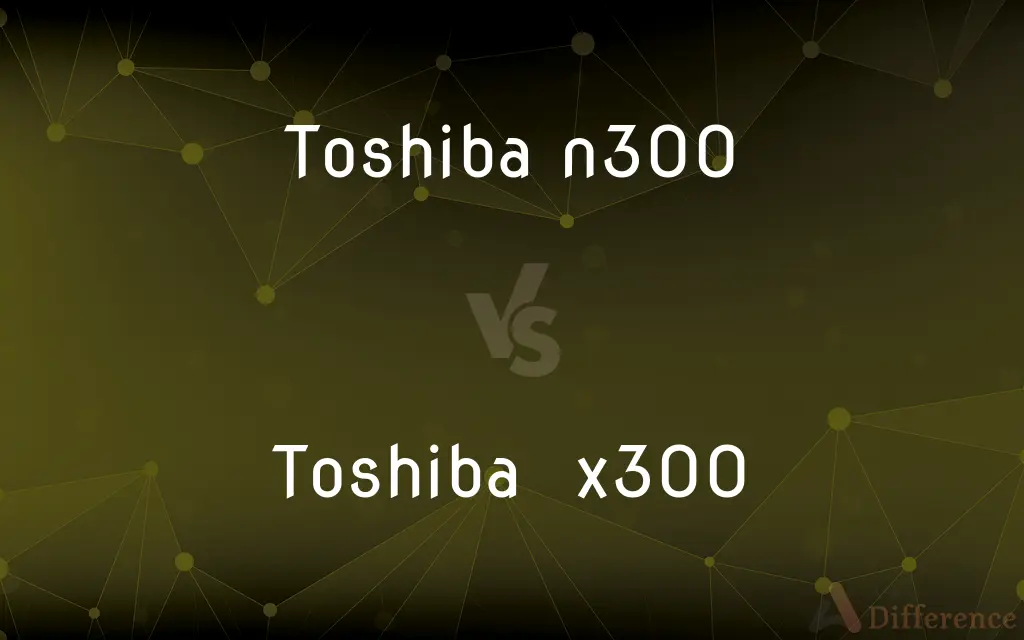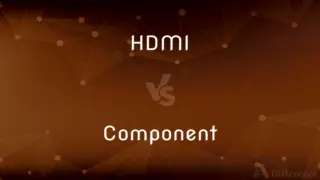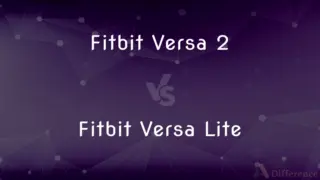Toshiba n300 vs. Toshiba x300 — What's the Difference?
By Tayyaba Rehman — Published on January 20, 2024
Toshiba N300 is a hard drive series designed for NAS systems, offering durability and reliability for continuous operation, while Toshiba X300 is designed for high-performance, high-capacity storage, suitable for gaming and graphic-intensive applications.

Difference Between Toshiba n300 and Toshiba x300
Table of Contents
ADVERTISEMENT
Key Differences
Toshiba N300 hard drives are optimized for NAS (Network Attached Storage) environments, supporting 24/7 operation with features like vibration resistance and integrated RV sensors for multi-drive systems. Toshiba X300 drives, on the other hand, focus on high-speed data processing, making them ideal for gaming PCs, graphic design, and other intensive applications.
The N300 series is built for reliability and data integrity in multi-drive NAS (Network Attached Storage) systems, offering high endurance and workload rate limits. The X300 series prioritizes performance with higher spin speeds and large cache sizes, providing faster access to large files and applications.
In terms of capacity, both N300 and X300 offer a range of sizes, but the X300 often reaches higher maximum capacities, catering to users needing substantial storage space for large multimedia files and games.
The N300 is designed to operate efficiently in a 24/7 NAS (Network Attached Storage) setup, making it a good choice for businesses and home users with extensive network storage needs. The X300, with its performance-oriented design, is more suited for individual users requiring fast access speeds for demanding applications.
The price point of the N300 reflects its specialized NAS (Network Attached Storage) -optimized features, often making it slightly more expensive than typical desktop hard drives, while the X300's pricing is influenced by its performance capabilities, catering to a different market segment.
ADVERTISEMENT
Comparison Chart
Designed For
NAS (Network Attached Storage) systems, 24/7 operation
High-performance computing, gaming
Key Features
Vibration resistance, reliability for NAS (Network Attached Storage)
High speed, large cache for fast data access
Endurance & Workload
High endurance, suitable for multi-drive setups
Designed for intensive individual use
Capacity Range
Wide range, NAS-optimized capacities
High maximum capacities for large files
Ideal User
Businesses, home NAS (Network Attached Storage) users
Gamers, graphic designers, multimedia users
Compare with Definitions
Toshiba n300
Suitable for business and extensive home network storage.
I chose the N300 for my home NAS due to its durability and reliability.
Toshiba x300
Provides fast access to large files.
Accessing large video files is quick with my X300 drive.
Toshiba n300
Features vibration resistance for multi-drive stability.
The vibration resistance of the N300 is ideal for our multi-drive NAS setup.
Toshiba x300
Offers higher maximum storage capacities.
I store my extensive game library on the X300 due to its large capacity.
Toshiba n300
Offers high endurance and workload rate limits.
The high endurance of the N300 ensures long-term reliability.
Toshiba x300
Caters to multimedia users needing quick data processing.
As a multimedia enthusiast, the X300's performance is exactly what I need.
Toshiba n300
Designed for continuous, 24/7 operation.
Toshiba N300 is perfect for our round-the-clock data access needs.
Toshiba x300
Ideal for gaming PCs and graphic design.
The X300's speed is great for my graphic design projects.
Toshiba n300
A hard drive series optimized for NAS systems.
We use Toshiba N300 drives in our office's NAS for reliable storage.
Toshiba x300
A high-performance hard drive for intensive applications.
My Toshiba X300 handles gaming and video editing effortlessly.
Common Curiosities
Can I use Toshiba N300 in a home NAS setup?
Yes, it's suitable for both home and business NAS systems.
Is the N300 good for vibration resistance?
Yes, it's built to resist vibrations in multi-drive setups.
What is the main use of the Toshiba N300?
It's designed for NAS systems and continuous operation.
Can the X300 handle graphic design work?
Yes, its speed and capacity are great for graphic-intensive tasks.
How does the X300 perform with large game files?
It offers fast access and storage for large gaming files.
Is the Toshiba N300 more expensive than regular hard drives?
It can be, due to its specialized NAS features.
Are Toshiba X300 drives suitable for video editing?
Yes, they are well-suited for video editing and other multimedia applications.
What are the speed features of the X300?
It has a high spin speed and large cache for quick data access.
Can the N300 and X300 be used in desktop PCs?
Yes, both can be used in desktop PCs, but with different optimal use cases.
What capacities does the N300 come in?
It offers a range of capacities, optimized for NAS use.
What is the Toshiba X300 best used for?
It's ideal for high-performance computing and gaming.
Do both drives come with a warranty?
Yes, Toshiba provides warranties for both models.
Can I use the X300 in a NAS?
While possible, it's not optimized for NAS like the N300.
Are these drives available in solid-state versions?
The N300 and X300 are hard disk drives, not solid-state drives.
Is data recovery easy on these drives?
Data recovery depends on the situation but using backup solutions is recommended.
Share Your Discovery

Previous Comparison
HDMI vs. Component
Next Comparison
Fitbit Versa 2 vs. Fitbit Versa LiteAuthor Spotlight
Written by
Tayyaba RehmanTayyaba Rehman is a distinguished writer, currently serving as a primary contributor to askdifference.com. As a researcher in semantics and etymology, Tayyaba's passion for the complexity of languages and their distinctions has found a perfect home on the platform. Tayyaba delves into the intricacies of language, distinguishing between commonly confused words and phrases, thereby providing clarity for readers worldwide.












































